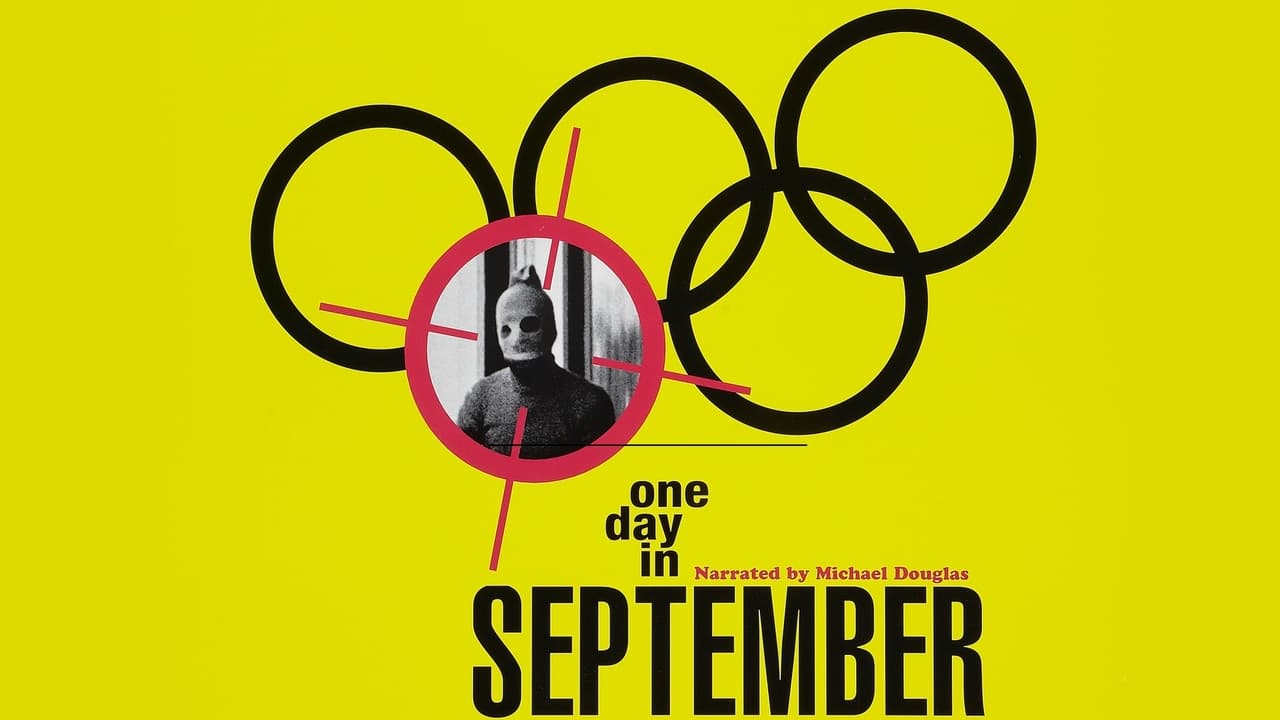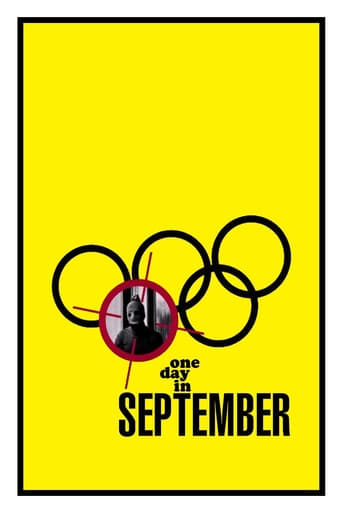



Too many fans seem to be blown away
Dreadfully Boring
It isn't all that great, actually. Really cheesy and very predicable of how certain scenes are gonna turn play out. However, I guess that's the charm of it all, because I would consider this one of my guilty pleasures.
View MoreA film of deceptively outspoken contemporary relevance, this is cinema at its most alert, alarming and alive.
View MoreWhether winter or summer, the Olympic Games are meant to be a place where the world comes together for the ultimate competition in athletics. It is the ideal that dates back to ancient times when the Greeks themselves invented the Olympics.But on September 5, 1972, in an ordeal that lasted into the early morning hours of the following day, the Olympic ideal was brutally attacked when members of a shadow Palestinian terrorist group known as Black September hopped over the fence at the Olympic Village in Munich and killed two Israeli athletes, holding nine others hostage and threatening to kill them unless their demands for freeing two hundred political prisoners were met. With Israel point-blank refusing to negotiate, and having to take responsibility for this, a rag-tag German hit squad unleashed their firepower on the terrorists at the Furstenfeldbruck airfield just outside of Munich; and although three of the eight terrorists were eventually captured and the other five died in the mêlée, so too did the remaining nine Israeli athletes. It was the first act of terrorism ever televised to an international audience; and in 1999, it was the focus of the Oscar-winning documentary ONE DAY IN September.Narrated by Michael Douglas, ONE DAY IN September examines, in a span of only ninety-one minutes, the way the 1972 Summer Olympics were laid out, and how it led to what took place. Munich was, just four decades before, the epicenter of the Nazi movement; and when it was awarded the '72 Games, memories of Hitler's 1936 Berlin Games, as well as the horrors of World War II and the Holocaust, were still fresh in the population's memories. The organizers of Munich '72 were determined to make it as different from "Hitler's Games" as was humanly possible; and while theirs were noble and good intentions, it turned out to be their undoing. The perimeter of the Olympic Village was a mere rusty fence, as opposed to sturdier materials like barbed wire (so as not to look like a concentration camp like Dachau, which was only seven miles away), and the security guards not only had no visible firearms on them, they didn't even look like security guards to begin with. This was how the eight Black September militants scaled the fence, with the unintentional help of drunk American athletes, and broke into the Israeli apartment at Connollystrasse 31. A great deal of negotiating between West Germany and Black September ensued, and the world was transfixed to their televisions, as they watched what had been up to that moment a peaceful Olympic celebration suddenly turned into the most overt act of terrorism the world had seen to that point.Attempts by the West German government to end the standoff by force were totally unsuccessful (the country had no counter-terrorism force of its own, and relied on municipal cops); and when the terrorists and the hostages were transported by helicopters to Furstenfeldbruck, the situation took the ultimate horrifying turn. A whole horde of untrained German snipers unloaded on the airfield; and over the next forty-five minutes, all hell broke loose. Once the mêlée was over, officials of the West German government and the Munich Olympic Committee had stated that the terrorists had been killed, but the Israelis had been saved. Later on, of course, it was revealed that something totally different had transpired. It was up to ABC sportscaster Jim McKay to deliver the terrible news to the world: "They're all gone." People who remember those terrible two days in September 1972 will certainly be reminded of them again when watching ONE DAY IN September; and those who only know of 9/11 will be reminded of how terrorism can turn good things bad in a hurry. The whole ordeal, down to the last horrifying battle at Furstenfeldbruck, was an act of well-meant but painfully inept West German planning; and while the decision to go on with the Olympic Games after the deaths may have been a way of both paying tribute to the murdered Israelis and thumbing its noses at terrorists, it was also extremely controversial. Scenes of athletic competition, including those of U.S. swimmer Mark Spitz and Russian gymnast Olga Korbut, are interspersed with the horrific events at Connollystrasse 31 to emphasize the tragic turn Munch '72 took in the span of only eighteen hours. The mood is emphasized further by Heffes' modern score, with contributions by Glass, and a performance of the Funeral March of Beethoven's Eroica Symphony, as performed by Rudolf Kempe and the Munich Philharmonic at the memorial for the athletes. In the end, ONE DAY IN September was richly deserving of the Oscar it got, and it should remind us all of how political terrorism not only poisoned the ultimate sporting event, but also led to far worse things to come.
View MoreI remember the 1972 Olympics from a kid's perspective (with no TV set at home). American swimmer Mark Spitz was its big star, everybody knew him. It really was the most modern and most hip event ever planned in Europe. The best architects and the best artists and designers of Germany were employed to build an Olympic village that still reflects the openness and optimism of the era. Even the logo, a kind of a spiral made of rays, is unforgettable. (The original movie Rollerball was largely filmed in the Olympic village).One Day in September catches the atmosphere that preceded the terrorist attack perfectly, in that sense it is an accomplished exercise in style. I think there really was a kind of innocence connected with it, people truly believed that sports could be a means to bring enemies closer and that the Olympic area was regarded as something like a sacred ground which everyday worries couldn't penetrate. I assume that explains very much the clumsy reaction of the German authorities when they were faced with the act of desecration" that constituted the callous act of the Palestinian terrorists. (I think the German officials who were ready to be interviewed for this documentary are unduly criticized for what some call indifference. Must have been hard enough for them to reminisce about something terrible for which I believe they feel at least partly responsible).The spirit of the Munich Olympics ended with that tragedy, and the Yom Kippur war the following year with the ensuing oil crisis changed the outlook on the future completely. Somehow I feel we still suffer from the shattered hopes of 1972. And where are the Palestinians now? Terrorism doesn't pay.
View MoreI can only agree on what most of the user comments here have pointed out: Notwithstanding the thrilling and gripping style - great editing for instance - in which the events are presented, the film as a whole is fairly questionable because of its undeniable intention to bash the Germans and their police force for what happened while at the same time refusing to investigate into other directions. Furthermore, it gives us little more than a glimpse of the terrorists' motivations, feeding the impression that we're watching a piece of propaganda that is - without a doubt - well executed. The probably most unbelievable faux-pas is that at no time during all the interviews the name of the witnesses are shown. Very amateurish! 8/10 for film-making, 2/10 for subject treatment. See it, but be aware of its slanted view!
View MoreI found this film, with its blurred boundaries between thriller and documentary, rather compelling and hard to look away from. My comments here are really more about the criticisms of the film than the film itself. I've read several comments about ONE DAY IN September from Europeans lamenting its treatment of the Germans and Palestinians. As an American, I admit much more sympathy for Israel than Palestine (despite the USA's shameful record on race, at least we didn't launch the Holocaust), but the film is more about the killing of the innocent (and bungled German efforts to save them) than a deep historical treatment of the Israeli-Palestinian conflict. (For that, I'd recommend FIFTY-YEAR WAR, a PBS Frontline documentary.) And I'm not sure it's totally unfair to condemn the Germans for failing to even have an anti-terrorist unit, considering that terrorism was already a rising problem in Europe by 1972. This film isn't objective and isn't obligated to be -- if a counterpart film appears, I'd certainly watch, but I don't expect it to elicit much sympathy on my side of the pond. (And, in case anyone thinks I'm a right-wing lunatic, I've never voted Republican and oppose the current war.)
View More